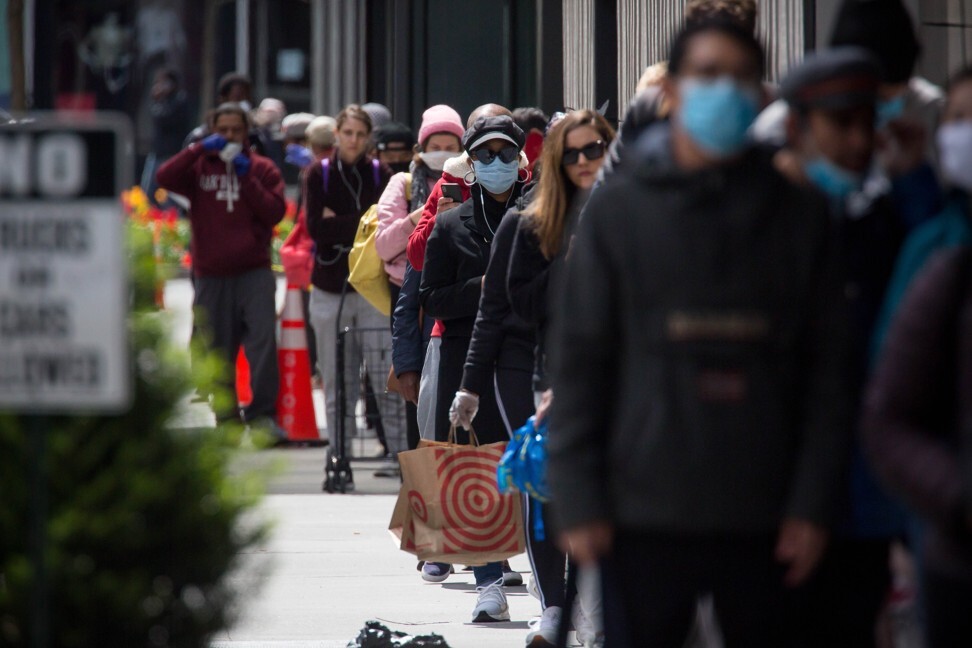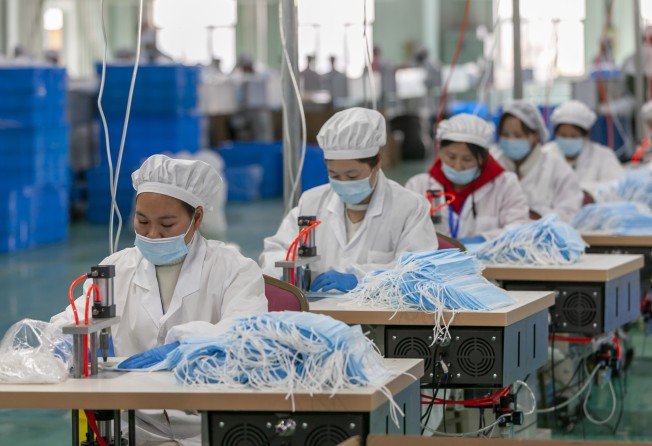
In the dash for medical gear amid the coronavirus, the US must realise it’s a seller’s market in China now
- In China, factories are running almost non-stop to supply a flood of orders for medical gear. Yet, US hospitals still insist on rigid procurement practices. They need to accept that it’s a seller’s market and recalibrate their expectations

The procurement of N95 masks and other personal protective equipment is getting more frenzied than a Black Friday sale in America. Across the world, the mad scramble for whatever medical gear is available continues, yielding a broad spectrum of ugly anecdotes: harsh payment terms (pay in full before anything is shipped out), fake masks, price gouging.
On the factory floor in China, orders flood in from an army of brokers, price quotes are relayed out, product registrations are verified, while workers scurry about at a frenetic pace – manning production lines, yelling orders in Chinese, above the din of constantly humming machines.
The reality of the situation is that it is a pure seller’s market and the factories have all the negotiating power over payment terms, due diligence requirements, production lead times and delivery schedules. This is difficult for most hospital administrators and purchasing agents to accept, and many continue to proceed cautiously.
Many agents representing US hospitals I have spoken to convey a sense of urgency and concern about supply shortages, but they are still adamant about: obtaining product samples (which takes weeks), reviewing a company’s financial statements, conducting video interviews with the company’s management, going on factory tours, and obtaining “proof of life” videos of the exact moment their goods are boxed up – as if in a hostage negotiation.

Clearly, there is an information asymmetry. It is true that hospital executives are being asked to take a leap of faith in a buying process over which they have little control. But their insistence on rigid procurement practices, amid a worsening health crisis in the US, is confounding.
A due diligence process that would normally take a few weeks needs to be compressed into days or even hours, which regrettably is something most buying agents and administrators are loath to do.
Despite the tighter time frame, it is still possible to obtain reasonable assurance – by validating certifications at the FDA (Food and Drug Administration) or CDC (Centres for Disease Control and Prevention) websites, verifying product specifications and standards, and making sensible plant inspections.
Factories in China are also facing their own set of challenges. After recent headlines from Europe about faulty Covid-19 test kits, Beijing stepped in to impose restrictions on medical supplies that can be sold abroad. Companies must now be on a government-approved vendor list regardless of whether they have already received certifications to sell to the US and Europe.
As a result of such restrictions, capacity has been greatly reduced, according to Cameron Johnson, head of Asia-Pacific strategy at FAO (Foreign Analytics & Operations) Global. The capacity for one product, for example, dropped to just 20 per cent of the previous level, he said.
This is what it is like on the ground. Factories are running shifts nearly 24/7 to churn out products or maintain overworked machines. In such an environment, factory executives only entertain orders from serious buyers, who are ready with purchase orders and proof-of-funds letters.
There is no time for onerous requests for product samples, product returns in case of damaged goods, money-back guarantees, “proof of life” videos, or video interviews with company employees.
Just as hospital executives in America are under stress, factories in China are having increasingly burdensome demands made on them. Amid this global free-for-all, their time is limited, their patience is thinning and their resources are strained.
Despite difficulties encountered, buyers can chart a more effective approach to securing personal protective equipment. First, most purchases are large, of hundreds of thousands or millions of pieces. If orders are smaller, it is better to aggregate purchases with different parties to keep per-unit and shipping costs down.
Order what you think you will need tomorrow, not today. With the pandemic growing by the day, it will be much harder to procure PPE in the coming months.
According to factory agents I spoke to, shipping costs are about 400 per cent higher than before Covid-19 and going up. Factories require 50 per cent down payments to slot you into their production run, and then the other 50 per cent before they ship anything out.
Some hospitals still insist on using credit cards or issuing final payment after the goods are received in the US. That won’t work. Payment terms are harsh because it’s a seller’s market. Buyers with proof-of-funds letters can lock in a price (but usually for no more than 48 hours). They need to decide without delay.
Moreover, almost forgotten in the conversation is that factories also need to serve China’s domestic need for masks, as well as Chinese companies abroad who are not able to procure protective gear in host countries.
Johnson at FAO Global predicted that “PPE capacity will be stretched well into 2021” given the huge demand. “It’s not just hospitals and staff that will need them, but restaurant workers, Amazon warehouse staff, Boeing machinists building a plane,” he said.
Back on the factory floor, I asked one of the supervisors about his firm’s role in the global effort. He summed it up best by saying, “Since coronavirus is well-controlled in China, we are trying our best to meet the world’s demand. There are many people that need our help.”
His words and sincere tone conveyed a shared sense of responsibility in the global fight. As for buyers, times have changed. They need to recalibrate due diligence expectations, fight decision-making inertia or else prices will go up and shipping rates will increase, as supply chains come under greater stress.
Joel A. Gallo is CEO of Columbia China League Business Advisory Co
Sign up now and get a 10% discount (original price US$400) off the China AI Report 2020 by SCMP Research. Learn about the AI ambitions of Alibaba, Baidu & JD.com through our in-depth case studies, and explore new applications of AI across industries. The report also includes exclusive access to webinars to interact with C-level executives from leading China AI companies (via live Q&A sessions). Offer valid until 31 May 2020.